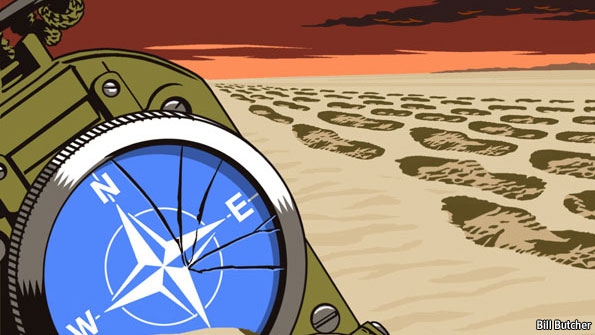
From the Economist: NATO’s meeting in Chicago this week was dominated by the need to unite behind plans for an orderly retreat from Afghanistan —more politely labelled as a transition to Afghan responsibility for the country’s own security. . . .
Rather than plotting a convincing path to that goal, Chicago showed how difficult it will be to reach. A troubling sideshow was the failure to get an agreement with Pakistan to reopen the NATO-led coalition’s southern supply route. This was abruptly closed last November, after a disastrous error led to the killing of 24 Pakistani soldiers by American air strikes.
Pakistan’s embattled (and deeply unpopular) president, Asif Ali Zardari, was invited in the expectation that he would seal a deal to get the trucks rolling again. But although he showed up, his demands were deemed so unreasonable that Barack Obama refused to meet him more than fleetingly. Mr Zardari wanted an apology from America for the deaths of his soldiers (Mr Obama has offered his condolences but not said sorry); a “tax” of $5,000 for each truck passing through Pakistan to Afghanistan (NATO is prepared to pay $500, double the previous amount); and an end to drone attacks on militants in Pakistan’s lawless tribal areas (drones deserve much of the credit for the decline of “core” al-Qaeda and remain central to America’s counter-terrorism strategy).
Mr Zardari’s position doubtless leaves room for haggling. But his apparent lack of negotiating space reflects both his own weakness and the virulence of anti-American sentiment among ordinary Pakistanis. For NATO, reopening the southern route is now less about supplying forces in Afghanistan than easing the logistical burden of getting vast quantities of materiel out by the end of 2014, when combat operations are meant to have ended.
The summit also laid bare NATO’s need to please three different audiences. Mr Obama and his European counterparts are desperate to persuade their voters, weary of war and austerity, that the expenditure of much blood and even more treasure on what many now count as a hopeless cause really is coming to an end. At the same time, they also want to reassure Afghans, a large majority of whom dread the return of a resurgent Taliban, that the world is not going to abandon them to civil war after 2014. That is what happened when the Soviet Union threw in the towel two decades ago. Third, they need to show the Taliban (and some of Afghanistan’s unhelpful neighbours) that, even when most Western combat troops will have gone, the government in Kabul will still have the support it needs to survive.
Image: economist%205%2025%2012%20Chicago%20Afghanistan%20Pakistan.jpg
